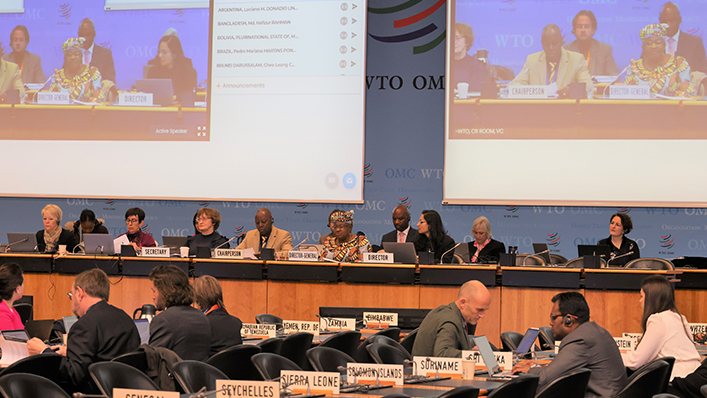
“Five years into implementation of the Agreement, the global implementation rate for commitments stands at 74%. This is positive,” DG Okonjo-Iweala said in her opening remarks at the Committee on Trade Facilitation’s dedicated session on technical assistance capacity building, held the same week as the committee’s regular meeting.
“However, a breakdown of that figure shows that the rate for developing members and least-developed countries (LDCs) is about 66% and LDCs lag behind significantly at 37%,” she continued. “Landlocked developing countries (LLDCs) also have a lower rate of implementing commitments, at 54%,” she said.
“I want to recognize the important contributions of development partners. But I also want to urge you to step up your efforts so we can achieve full implementation,” the Director-General said, adding that she supports the focus on reviewing technical assistance for members that have TFA implementation commitments due in the next two years. “I urge you to take this work forward, since it is an important part of our wider efforts to bring people and countries from the margins to the mainstream of the global economy.”
Her full remarks are available here.
The TFA contains commitments for members to expedite the movement, release, and clearance of goods, including goods in transit. It is the first WTO agreement in which developing and LDC members can determine their own implementation schedules and seek to acquire implementation capacity through the provision of related assistance and support. Developed members were required to implement all provisions of the TFA from its entry into force.
According to the Secretariat’s report to the committee, 54 members have commitments to implement certain TFA provisions by 2023 and 2024. The most common provisions due in that period involve granting trade facilitation measures such as simplified paperwork and rapid clearances to qualified “authorized operators”; adopting or maintaining a risk management system for customs control; ensuring cooperation among authorities responsible for border controls; establishing a single window for submission of requirements; and measuring and publishing average release times.
The Secretariat report also notes that 36 donors and agencies have submitted notifications about the technical assistance they provide. More information is available on the TFA database.
The focus on provisions due for implementation in the next two years is in line with WTO members’ recommendations in the TFA review conducted in 2021, said the chair of the committee, Ambassador Adamu Mohammed Abdulhamid of Nigeria.
Beneficiaries and donor partners took the floor to share experiences on TFA implementation and their needs moving forward.
Nepal, on behalf of the LDC Group, said much of the implementation success among the group’s members was strongly correlated to support received from partners. The LDC Group added that the expedited implementation of TFA provisions, including in the most vulnerable economies, is a joint responsibility of both beneficiaries and donor partners.
Botswana, on behalf of LLDCs, said accelerated implementation of the TFA is important to ensure LLDCs are able to remain competitive despite the ongoing global crises. LLDCs also rely on full implementation of the TFA by countries through which goods are transited.
Several donor members and donor organizations gave presentations on programs for implementing key TFA provisions over the next two years, and beyond. Many highlighted the need for beneficiaries to notify to the WTO of their needs so that support can be more targeted.
“The importance of trade facilitation can never be overemphasized because we have seen tremendous reductions of time release in ports and many other places. I continue to urge members to bring up their needs, so that the donors will be able to help them address those so that eventually we will have 100% implementation of the TFA,” the committee chair said.
The dedicated session also included experience sharing on ongoing assistance programs, a presentation on where further collaboration might be needed for TFA implementation, reports by international and regional organizations for their activities since October 2021, and the draft work plan of the TFA Facility.
Regular meeting of the committee
The dedicated session was held after Committee’s regular meeting on 28-29 November, where members reviewed over 40 notifications and heard experience-sharing presentations, including from India on its time release study, Senegal on its digital tools for trade in plant and other farm products, and from Ghana and Cote D’Ivoire on their enquiry points.
The Committee heard from regional trade facilitation committees and regional communities for the first time, with many speakers highlighting advantages of regional cooperation. The presentations were made by the Caribbean Community and Common Market (CARICOM), the Economic Community Of West African States (ECOWAS), the Pacific Islands Forum, and the Secretariat of Central American Economic Integration (SIECA).
Botswana, on behalf of LLDCs, requested the Secretariat to prepare a follow up study to a previous report mapping transit corridors and trade bottlenecks. China delivered a statement calling for discussions in the committee on digital trade facilitation technologies.
The next Committee meetings are tentatively scheduled next year for 21-22 March, 15-16 June, and 3-5 October.
Share
Reach us to explore global export and import deals